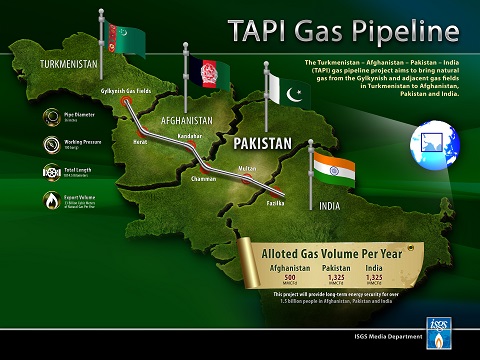Turkmenistan Wants Fast Completion Of Turkmen-Afghan-Pakistan-India Gas Pipeline
Turkmenistan President Gurbanguly Berdimuhamedov has discussed with Pakistani President , Arif Alvi, his desire for the Pakistan government to start construction works on the Pakistani segment of the TAPI gas pipeline.
“President Gurbanguly Berdimuhamedov expressed hope that with the assistance and support of his Pakistani counterpart, the construction of the gas pipeline in Pakistan’s territory would soon begin,” as reported by the Turkmen state-run Neytralny Turkmenistan (Neutral Turkmenistan) newspaper.
According to the report, the Turkmen section of the pipeline is near completion, with the country eager to commence exports. They are not alone: Russian gas companies Rosneft, Lukoil, and Gazprom are all eager to take part in developing oil and gas fields in Turkmenistan, while India is energy poor and needs supplies.
The Turkmenistan–Afghanistan–Pakistan–India Pipeline (TAPI), also known as Trans-Afghanistan Pipeline, is being being developed by the Galkynysh – TAPI Pipeline Company Limited with participation of the Asian Development Bank. The pipeline will transport natural gas from the Galkynysh Gas Fields in Turkmenistan, and run through Afghanistan into Pakistan and then to India. Construction on the project started in Turkmenistan on 13 December 2015, work on the Afghan section began in February 2018, and work on the Pakistani section was planned to commence in December 2018 but has been delayed, in part to this years problems with Covid-19. India has already completed its part of the pipeline.

The 1814-kilometer pipeline has been designed for a 30-year period and is expected to supply about 33 billion cubic meters (bcm) of gas per year from Turkmenistan’s giant Galkynysh gas field through the Afghan cities of Herat and Kandahar, as well as the Pakistani cities Quetta and Multan. The pipeline ends at the Indian city of Fazilka, located near its border with Pakistan. Five bcm out of the entire volume will be absorbed by Afghanistan, while Pakistan and India will receive 14 bcm each. There have also been discussions about China joining the route. If so, this would require the building of a new link from Pakistan to China. This could act as alternative to Chinese plans to build a fourth China-to-Turkmenistan pipeline, which has to cross several mountain ranges, meaning it would be cheaper and easier for China to build a line from Pakistan across the Karakoram Range to its Western border.
Related Reading
- Turkmenistan’s OBOR Contributions – Gas, Tourism & Light Trade Potential
- First Caspian Economic Forum May Help Bring Turkmenistan Into The Belt & Road Initiative
About Us
Silk Road Briefing is written by Dezan Shira & Associates. The firm has 28 offices throughout Asia, and assists foreign investors into the region. For strategic advisory and business intelligence issues please contact the firm at silkroad@dezshira.com or visit www.dezshira.com





